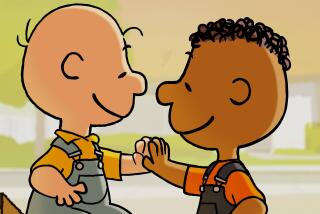See You Around, Charlie Brown
- Share via
Few popular icons have lasted half a century. The genius of Charles Schulz, the creator of “Peanuts,” has been to portray the profundity in ordinariness, in chronicling the hopes, foibles and frustrations of everyday events in a way that was elevating even as it humbled.
He did this, decade in and decade out, primarily through the newspaper comic strip, a vehicle that he contended, and then demonstrated, was a very special format. His universal appeal was quite literal; even a trip to the moon in 1969 was made in vehicles nicknamed Charlie Brown and Snoopy. Later there were TV specials, videos, a “Peanuts” musical.
The news that Schulz will retire shortly after New Year’s comes when a holiday season is upon us. This time of year, with its intermingling of expectations, anxieties and uplifting moments, is well suited to the spirit and purpose of “Peanuts.” In the 1992 video “It’s Christmastime Again, Charlie Brown,” the famous little character buys gloves at a department store for the little red-haired girl he can never get, only to find out that she has bought her own pair. The knowledge that Snoopy can use them to keep warm provides comfort in the latest instance of life’s disappointments.
Those disappointments included Charlie Brown’s perennial frustrated attempts to kick a football held by the ever-petty Lucy. This and other setbacks struck a chord with anyone whose quests came up short. Children and a dog were the conveyors of wisdom about indignities and lessons.
An author in Chicago created a stir and a bestseller in 1965 by probing the depths of the theology he found in Schulz’s work. But anyone could connect with the juxtaposition of the sacred and the ordinary in the comic strip and grasp easily the search for meaning that was communicated there. In the Christmastime video, the wise Linus is seated in a chair sans security blanket next to the inquisitive Sally. She asks him to explain the meaning of Christmas, and when he reads from the gospel of Luke about the angels appearing before shepherds, she wonders instead about the cost of gifts and concludes that she really doesn’t want to spend anything at all. Linus collapses in his chair with the book over his head.
A strip that began when Harry S. Truman was president will conclude in a new century and in a changed nation. Through five decades, Schulz’s work brought American life down to scale, where our most basic sentiments play out. It has provided us with something invaluable and hard to find nowadays, a sort of gentle guide to getting along.
More to Read
Sign up for our Book Club newsletter
Get the latest news, events and more from the Los Angeles Times Book Club, and help us get L.A. reading and talking.
You may occasionally receive promotional content from the Los Angeles Times.








